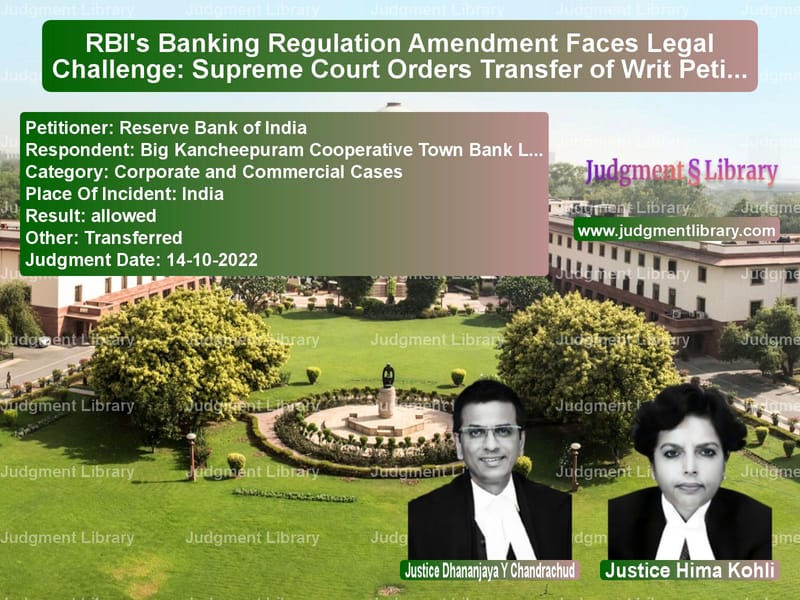RBI’s Banking Regulation Amendment Faces Legal Challenge: Supreme Court Orders Transfer of Writ Petitions
The Reserve Bank of India (RBI) sought the transfer of multiple writ petitions filed before various High Courts challenging the validity of the Banking Regulation (Amendment) Act, 2020, and the RBI’s circular issued on June 25, 2021. The Supreme Court of India, in its judgment dated October 14, 2022, decided to consolidate all pending petitions and transfer them to the Madras High Court for uniform adjudication.
These writ petitions raise fundamental questions regarding the legal validity of the amended banking law and its impact on cooperative banks, particularly concerning the appointment of Managing Directors (MDs) and Whole-Time Directors (WTDs) in Primary (Urban) Cooperative Banks.
Background of the Case
The Banking Regulation (Amendment) Act, 2020 (Act No. 39 of 2020) introduced significant changes to the regulatory framework governing cooperative banks. Following this amendment, the RBI issued a circular on June 25, 2021, titled “Appointment of Managing Director (MD) / Whole-Time Director (WTD) in Primary (Urban) Co-operative Banks.”
Several cooperative banks and banking institutions challenged both the amendment and the circular before various High Courts across India, citing concerns over their autonomy and the impact of the new regulatory framework. These challenges were spread across multiple jurisdictions, including the High Courts of:
- Andhra Pradesh
- Chhattisgarh
- Karnataka
- Kerala
- Madhya Pradesh
- Madras
- Punjab and Haryana
- Uttarakhand
- Allahabad
- Rajasthan
- Bombay
RBI’s Arguments
The RBI, through its senior counsel, sought the transfer of all writ petitions to a single High Court for effective adjudication. The main contentions presented by the RBI were:
- The issues raised in the writ petitions were common and involved a uniform interpretation of the Banking Regulation (Amendment) Act, 2020.
- Having multiple High Courts adjudicate the matter separately could lead to conflicting judgments.
- Judicial discipline and consistency in legal interpretation warranted consolidation of all cases before a single High Court.
Arguments by the Petitioners
The petitioners, primarily cooperative banks, opposed the RBI’s move, arguing:
- The Banking Regulation (Amendment) Act, 2020, encroached upon the autonomy of cooperative banks.
- The RBI’s circular of June 25, 2021, was arbitrary and imposed excessive restrictions on cooperative banks.
- Each High Court had jurisdiction over cases involving cooperative banks operating within their respective states.
Supreme Court’s Observations
The Supreme Court considered the submissions from both sides and noted the following:
- The petitions filed across various High Courts raised identical legal and constitutional questions.
- It would be in the interest of justice to consolidate all cases before a single High Court.
- The Madras High Court would be the appropriate forum for adjudicating the matter to ensure consistency and efficiency in judicial proceedings.
Final Verdict
The Supreme Court ordered that:
- All writ petitions challenging the Banking Regulation (Amendment) Act, 2020, and/or the RBI circular dated June 25, 2021, be transferred to the Madras High Court.
- The Chief Justice of the Madras High Court would assign all such petitions to a single Bench for expeditious disposal.
- Since the petitions were originally filed in different High Courts, virtual hearing options should be made available to parties for convenience.
- Any future petitions challenging the amendment or circular must be transferred immediately to the Madras High Court.
Implications of the Judgment
The Supreme Court’s decision has far-reaching implications for both the RBI and cooperative banks:
- It ensures uniform adjudication of legal challenges against the amended banking law and the RBI’s regulatory framework.
- Cooperative banks will have a centralized forum to present their grievances and seek relief.
- The RBI will be able to defend its regulatory decisions before a single High Court, reducing the risk of conflicting rulings.
- The judgment reinforces the principle of judicial efficiency by consolidating cases with common legal questions.
This ruling is a significant step toward ensuring clarity and consistency in banking regulations affecting cooperative banks. The decision also underscores the judiciary’s role in balancing regulatory authority with the autonomy of financial institutions.
Petitioner Name: Reserve Bank of India.Respondent Name: Big Kancheepuram Cooperative Town Bank Ltd. & Anr..Judgment By: Justice Dhananjaya Y Chandrachud, Justice Hima Kohli.Place Of Incident: India.Judgment Date: 14-10-2022.
Don’t miss out on the full details! Download the complete judgment in PDF format below and gain valuable insights instantly!
Download Judgment: reserve-bank-of-indi-vs-big-kancheepuram-coo-supreme-court-of-india-judgment-dated-14-10-2022.pdf
Directly Download Judgment: Directly download this Judgment
See all petitions in Banking Regulations
See all petitions in Company Law
See all petitions in Corporate Governance
See all petitions in Judgment by Dhananjaya Y Chandrachud
See all petitions in Judgment by Hima Kohli
See all petitions in allowed
See all petitions in Transferred
See all petitions in supreme court of India judgments October 2022
See all petitions in 2022 judgments
See all posts in Corporate and Commercial Cases Category
See all allowed petitions in Corporate and Commercial Cases Category
See all Dismissed petitions in Corporate and Commercial Cases Category
See all partially allowed petitions in Corporate and Commercial Cases Category







